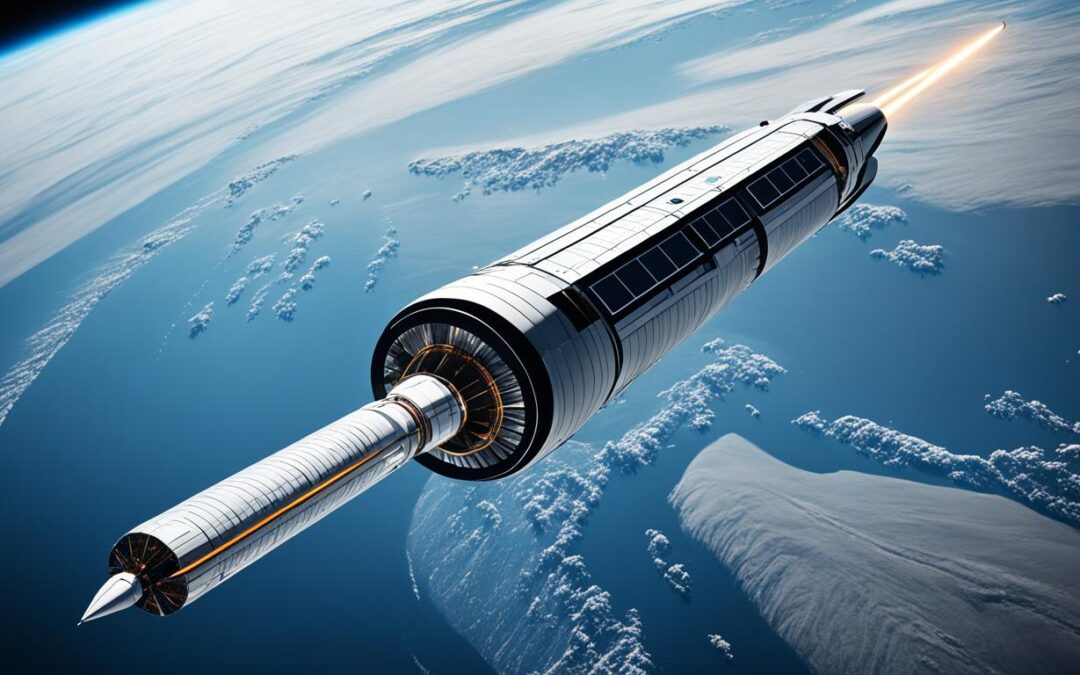Welcome to an exciting world where technology and gadgets take us beyond the boundaries of our planet. In the future of space exploration, NASA envisions a remarkable journey filled with innovation and discovery. Strap in and get ready to explore the possibilities!
In the race to unlock the mysteries of the universe, NASA is leading the way, focusing on human exploration, cutting-edge technology, and groundbreaking science. The roadmap includes plans to return to the Moon, serving as a catalyst for future missions to Mars and beyond. But that’s just the beginning.
NASA is also embracing commercial partnerships, collaborating with companies in launching rockets, transporting cargo and crew, and building infrastructure. This collaboration aims to develop a vibrant low-Earth orbit economy, paving the way for new opportunities and advancements in space exploration.
As NASA ventures further, its commitment to scientific discovery remains unwavering. The agency will continue to deepen our understanding of our planet and the universe, contributing to global scientific advancements that benefit us all.
The future of space exploration holds endless possibilities for technology and gadgets that will revolutionize our understanding of the universe. With each step we take, we are one step closer to unlocking the secrets of the cosmos. Are you ready to join the journey?
The Role of NASA in Space Exploration
NASA, the National Aeronautics and Space Administration, continues to play a crucial role in advancing space exploration. With a focus on the Moon, Mars, and scientific discovery, NASA is at the forefront of pushing the boundaries of human exploration and understanding the universe.
Building upon its partnerships with industrial, international, and academic entities, NASA is leveraging collaborations from the space station era to propel its future missions. The agency’s endeavor to explore the depths of space is supported by its deep space exploration backbone, which includes the powerful Space Launch System (SLS), the reliable Orion spacecraft, and the innovative Gateway lunar command module.
The Gateway serves as a critical staging point for missions, enabling astronauts to explore more parts of the lunar surface than ever before. This lunar outpost will facilitate scientific research, resource utilization, and international cooperation, ultimately paving the way for sustained human presence on the Moon.
NASA’s commitment to space exploration goes beyond celestial bodies. The agency also recognizes the importance of Earth science research in improving our understanding of our own planet and its changes. By studying Earth from an extraterrestrial perspective, NASA contributes to a greater comprehension of climate patterns, natural disasters, and the environment.
In addition to scientific exploration, NASA’s work in aeronautics contributes to aviation advancements, national security, and the global aviation economy. Through partnerships and research, the agency strives to revolutionize air transportation and enhance the efficiency and safety of aviation systems.
In summary, NASA’s continuous efforts in space exploration, with a primary focus on the Moon, Mars, and scientific discovery, are driven by collaboration, technological innovation, and a deep understanding of Earth. By pushing the boundaries of human knowledge and exploration, NASA holds the key to unlocking the mysteries of the cosmos and shaping the future of space exploration for generations to come.
Commercialization of Low-Earth Orbit
In the future, the commercial space industry will become a key player in the exploration of space. Companies will take on pivotal roles in various aspects, including launching rockets and satellites, transporting cargo and crew, and building essential infrastructure in low-Earth orbit. This collaboration between NASA and the commercial sector will drive innovation and technological advancements in the field of space exploration.
With a focus on fostering scientific research and technological development, NASA aims to facilitate the commercialization of low-Earth orbit. By harnessing the expertise and resources of commercial entities, NASA can expand human presence beyond our planet and establish a robust low-Earth orbit economy. This partnership is set to unlock new opportunities for space exploration and drive the growth of the commercial space industry.
Benefits of Commercialization
Commercialization of low-Earth orbit offers significant benefits for both NASA and commercial entities. Let’s explore some of the advantages:
| Benefits | Description |
|---|---|
| Accelerated Innovation | Collaboration between NASA and the commercial sector fuels rapid advancements in technology, creating a competitive and innovative environment. |
| Cost Reduction | Increased participation from commercial companies leads to cost-sharing and economies of scale, making space exploration more affordable. |
| Market Expansion | Commercialization diversifies the space industry, opening up new markets and opportunities for growth. |
| Job Creation | The growth of the commercial space industry generates employment opportunities, attracting top talent. |
| Technological Spin-offs | Technologies developed for space exploration often find applications beyond the industry, benefiting various sectors on Earth. |
Through the commercialization of low-Earth orbit, NASA and commercial entities are pioneering a new era of space exploration. The collaboration offers exciting possibilities for scientific discoveries, technological advancements, and the expansion of human presence in the cosmos.
Benefits of Space Exploration
Investment in space exploration has evolved from the space race era to a focus on protecting human life from catastrophic events and leveraging the resources of space. The potential benefits of space exploration are vast and diverse, with profound implications for human civilization and scientific advancements.
Space colonization represents a potential solution for ensuring the survival of human civilization in the event of a planetary disaster. By establishing colonies on other celestial bodies, such as the Moon or Mars, humanity can establish a backup plan and increase its chances of long-term survival. This could be particularly crucial in the face of potential threats to Earth’s environment or the occurrence of global cataclysms.
Furthermore, space exploration enables unique research opportunities that contribute to advancements in various fields. Scientists and researchers can conduct experiments in microgravity environments, leading to breakthroughs in biomedical research, material science, and technology advancement. Studying the effects of space travel on the human body provides valuable insights that can aid in the development of medical treatments and therapies.
Space research also plays a crucial role in our understanding of the Earth’s environment and its changes over time. Satellites provide essential data for monitoring climate patterns, natural disasters, and environmental conditions. This knowledge aids in developing strategies to mitigate the impact of climate change and protect our planet.
A Look at Ongoing Space Research Initiatives
Space agencies and organizations are actively engaged in space research projects that push the boundaries of human knowledge and technology. For instance, the Breakthrough Starshot mission aims to send uncrewed missions to nearby star systems in search of habitable planets and potential extraterrestrial life. On the other hand, robotic Mars rovers like Rosalind Franklin and Mangalyaan 2 continue to explore the Martian surface, deciphering clues about the planet’s past and potential for supporting life.

Space exploration provides valuable insights that have far-reaching implications for our society. Whether it’s protecting humanity, advancing scientific knowledge, or safeguarding the environment, the benefits of space research are profound. As we continue to explore and unlock the mysteries of the universe, we pave the way for a brighter and more resilient future.
Future Missions and Exploration Targets
The future of space exploration holds exciting prospects for missions to various destinations and exploration targets. NASA and SpaceX have ambitious plans to further expand our knowledge of the universe and push the boundaries of human exploration.
Moon Missions
NASA’s Artemis program aims to return humans to the Moon by 2024, with the goal of establishing a sustainable presence. This mission will pave the way for future deep space exploration, including crewed missions to Mars. By conducting extensive research and testing technologies on the Moon, scientists and astronauts will gather valuable data and improve our understanding of long-duration space travel.
Mars Missions and Human Colonization
SpaceX, led by Elon Musk, has set its sights on Mars. The company plans to send crewed missions to the red planet and ultimately establish a human colony. This ambitious goal requires extensive research, testing, and technological advancements to ensure the safety and sustainability of long-term human habitation on Mars.
Next-Generation Space Stations
The International Space Station (ISS) has been a pivotal platform for scientific research and collaboration. However, the National Aeronautics and Space Administration (NASA) plans to replace the ISS with a new space station in the late 2020s or 2030s. The new station will provide enhanced capabilities and opportunities for experiments in space, pushing the boundaries of our understanding even further.
Asteroid Exploration and Resource Utilization
Exploring asteroids and harnessing their resources is another key focus for future space missions. Establishing mining and fueling outposts in the asteroid belt could provide the necessary resources for further exploration and sustainability in space. Scientists and engineers are working on technologies to identify valuable resources on asteroids and develop methods for extracting and utilizing them.
Missions to Gas Giants and Outer Solar System Exploration
Robotic missions to gas giants like Jupiter and Saturn’s moon Enceladus are on the horizon. These missions will allow scientists to gain valuable insights into the composition, atmosphere, and potential for habitability of these distant worlds. The data collected from these missions will deepen our understanding of the outer solar system and open doors to further exploration.
Future Missions and Exploration Targets Summary
| Mission/Target | Description |
|---|---|
| Moon Missions | NASA’s Artemis program aims to establish a sustainable presence on the Moon, supporting future missions to Mars. |
| Mars Missions and Human Colonization | SpaceX plans to send crewed missions to Mars and establish a human colony on the red planet. |
| Next-Generation Space Stations | The International Space Station will be replaced by a new space station with enhanced capabilities. |
| Asteroid Exploration and Resource Utilization | Mining and fueling outposts in the asteroid belt for resource utilization and sustainability in space. |
| Missions to Gas Giants and Outer Solar System | Robotic missions to explore gas giants like Jupiter and Saturn’s moon Enceladus. |
Reusable Rockets and Automation in Space Travel
Reusable rockets are revolutionizing the space travel industry, offering a cost-effective and sustainable solution for exploring the cosmos. Companies like SpaceX are pioneering the development of reusable rocket technology, significantly reducing the expense of launching payloads into space. With reusable rockets, the focus shifts from building new rockets for each mission to designing rockets that can be used multiple times, resulting in substantial savings.
One of the exciting implications of reusable rockets is the potential for space tourism. With reduced costs, space travel becomes more accessible to the general public, allowing individuals to experience the awe-inspiring beauty of space firsthand. Imagine a future where you can embark on a journey to the stars, witness the Earth from above, and explore celestial wonders like never before. Reusable rockets make this dream of space tourism closer to becoming a reality.
Furthermore, automation and robotics play a crucial role in the future of space exploration. As we venture farther into the cosmos, the challenges and risks associated with human space travel become more apparent. Robots, on the other hand, are not limited by the physical and physiological constraints that humans face. They can withstand extreme conditions, carry out complex tasks, and operate with unparalleled precision.
The automation of space exploration will not only make missions more efficient but also enhance the safety of space travel. Rockets can be autonomously piloted without the need for human intervention, minimizing the risks posed by human error. This level of automation in space travel opens up new frontiers and paves the way for more ambitious missions.
With reusable rockets and automation, the future of space travel is filled with endless possibilities. Whether it’s venturing into the far reaches of our solar system or embarking on interstellar journeys, technological advancements are propelling us towards a new era of space exploration. The cosmos awaits, and we are on the cusp of an extraordinary era in human history.
Careers in Space Exploration
The future of space exploration holds numerous opportunities for individuals with a passion for discovery and the necessary skills and expertise. As we explore the vast depths of the universe, careers in space exploration become increasingly relevant and rewarding. Whether you have a background in engineering, astrophysics, planetary science, robotics, or mission control, there are exciting prospects awaiting you.
Space exploration provides a wide range of career paths that contribute to our understanding of the cosmos and push the boundaries of human knowledge. From designing and building advanced spacecraft to conducting groundbreaking research, every role plays a vital part in our quest to uncover the mysteries of space.
Here are some of the dynamic careers in space exploration:
| Field | Opportunities | Required Skills |
|---|---|---|
| Engineering | Designing and building spacecraft, propulsion systems, and astronomical instruments. | Strong technical and problem-solving skills, knowledge of physics and mathematics. |
| Astrophysics | Studying the properties, behavior, and evolution of celestial objects and phenomena. | Expertise in physics, mathematics, and data analysis, strong analytical and research skills. |
| Planetary Science | Exploring planets, moons, asteroids, and comets to understand their composition and history. | Knowledge of geology, chemistry, and space missions, proficiency in research and analysis. |
| Robotics | Developing autonomous systems and robotic technology for space exploration. | Expertise in robotics, artificial intelligence, and programming, problem-solving abilities. |
| Mission Control | Overseeing space missions, monitoring spacecraft operations, and ensuring mission success. | Strong communication and leadership skills, ability to make critical decisions under pressure. |
If you’re aspiring to make an impact in the field of space exploration, education and training are essential. Pursuing relevant degrees in science, technology, engineering, or mathematics (STEM) will provide a solid foundation for a career in this exciting industry. Additionally, seeking internships or research opportunities with space agencies and private companies can help enhance your practical skills and open doors to new possibilities.
Space exploration offers not only the chance to contribute to scientific advancements but also the opportunity to inspire future generations through your work. By joining this incredible journey, you become part of a dedicated community of curious minds seeking to unravel the mysteries of the universe.
Embrace the possibilities that space exploration careers have to offer and embark on a thrilling adventure of discovery, innovation, and exploration.
Conclusion
The future of space exploration is filled with incredible opportunities for technological advancements and the utilization of cutting-edge gadgets to explore the vast universe. With NASA’s ambitious plans for lunar and Mars missions, the commercialization of space, and the development of new technologies, the future of space exploration is set to be remarkable.
One of the key drivers shaping the future of space exploration is the use of reusable rockets, which have the potential to revolutionize space travel by significantly reducing costs and increasing accessibility. Alongside this, the automation of space travel holds promise in making space missions more efficient and safer. This will pave the way for a new era where robots, equipped with advanced technology, take on the challenges of space exploration.
Another exciting aspect of the future of space exploration is the potential for space tourism. As technology advances, more individuals will have the opportunity to embark on space adventures and experience the wonders of the cosmos firsthand. This new frontier in tourism will offer a unique and unforgettable experience for those who dare to venture beyond Earth’s atmosphere.
As we continue to push the boundaries of space exploration, the need for skilled professionals in space-related fields will become increasingly crucial. From engineering to astrophysics, planetary science to robotics, the future of space exploration presents numerous career opportunities for those passionate about exploring the unknown and making groundbreaking discoveries. So, prepare yourself for an extraordinary journey into the future of space exploration, where technology, gadgets, and human ingenuity propel us further than ever before.

